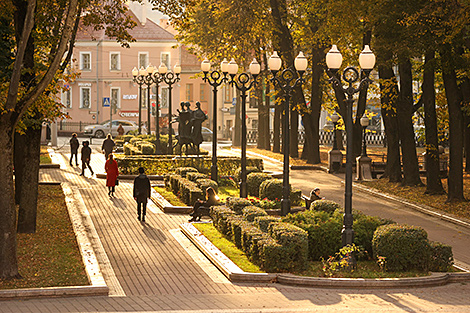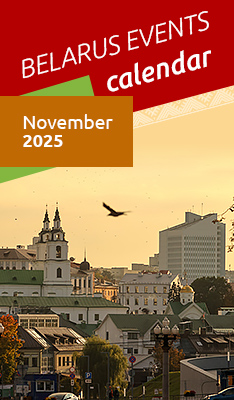Opinions & Interviews
Sociologist: Over 95% of Belarusians perceive their country as safe, peaceful

An archive photo
MINSK, 30 October (BelTA) - Over 95% of Belarusians note that they live in a safe and peaceful country, Aleksandr Postavsky, Deputy Director for Science at the Institute of Sociology of the National Academy of Sciences of Belarus (NASB), told the media ahead of the fifth international conference “Social Knowledge in Modern Society: Problems, Patterns, Prospects,” BelTA has learned.
The NASB Institute of Sociology is engaged in fundamental and applied research on Belarusian society. “Our sociological research focuses on things relevant for our people. This includes the historical memory of Belarusian society, media consumption, and attitudes towards the healthcare and education systems. All these current trends and topics are directly in demand and are part of the information agenda. There is a separate area - tasks from state governing bodies, specifically a project on trust in the media. This is a joint research project with the Information Ministry of Belarus,” Aleksandr Postavsky said.
According to the sociologist, the most significant achievement of the more than 30-year development of the institution of the presidency is people’s sense of safety. “Over 95% of Belarusians note that they live in a safe and peaceful country. Once again, the factor of societal stability is a fundamental concept of our statehood. It is also necessary to note that people pay more attention to historical memory, acknowledge the importance of history. A person who loves history, in the opinion of the majority of respondents, is a patriot of their country,” he said.
“Undoubtedly, the Institute of Sociology keeps pace with the times and applies artificial intelligence in its research,” Aleksandr Postavsky added. “The favorable conditions created by the head of our state and the government for the development of scientific research contribute to strengthening the country's scientific and technological security and allow for scientific and technological progress. Sociologists work with vast arrays of empirical data. The data needs to be analyzed by gender, age, and various quotas, but we must not forget that artificial intelligence should not replace human intelligence,” he said.
He noted that sociologists from Russia and Kazakhstan are taking part in the scientific conference. “We will discuss the current trends, sociological research, general aspects of the Union State's safety and security, and questions regarding the application of artificial intelligence in various studies. This is a platform for dialogue to exchange constructive opinions on advanced technologies in the field of sociological sciences. Such dialogue is necessary. We need to cooperate and work together,” the sociologist stated.
Eduard Solovyov, Head of the Political Theory Section at the Institute of World Economy and International Relations of the Russian Academy of Sciences, emphasized that active cooperation with the Belarusian side is underway on various tracks within the Union State. “We have a system of grant programs. This is already the fifth conference. in previous years, it has always been interesting here. It is a useful platform for learning,” he shared.
Eduard Solovyov plans to present a report on the transformion of party-political systems in modern Western countries. “I will speak about quite interesting processes taking place there,” the scholar said.
Senior Researcher Pavel Dudin from the Institute of Mongolian, Buddhist, and Tibetan Studies of the Siberian Branch of the Russian Academy of Sciences will speak about the opportunities that artificial intelligence opens up for social and humanitarian research and will demonstrate a number of cases that have already proven effective. “We work with ancient manuscripts (some are presented here at the exhibition), with ancient maps and Oriental languages. For example, Classical Chinese Wenyan was, until recently, accessible only to experts. Artificial intelligence has made it possible to gain access to very important and unique artifacts literally within a matter of hours,” he stated.
Pavel Dudin mentioned that this is his first time visiting Belarus. “The feeling is as if I am home. I hope this is not my last visit here. There was a time when I reached out to the National Library of Belarus for some research materials,” the scholar said.







 print version
print version make home page
make home page add to bookmarks
add to bookmarks

